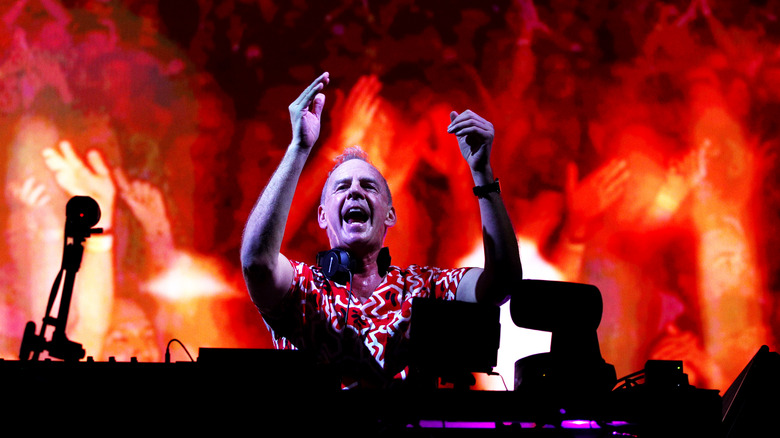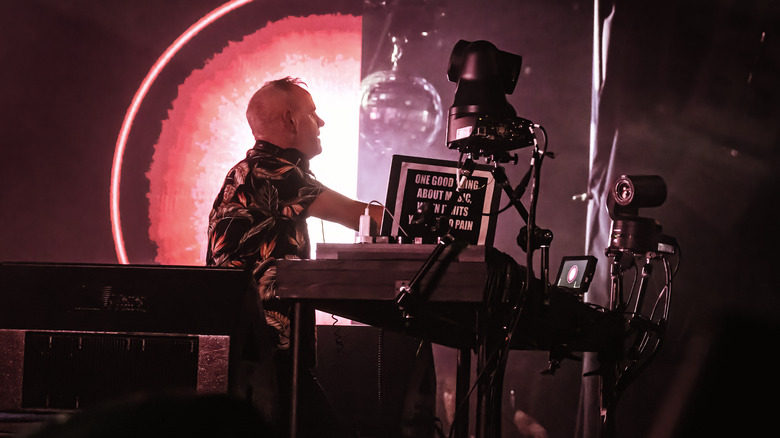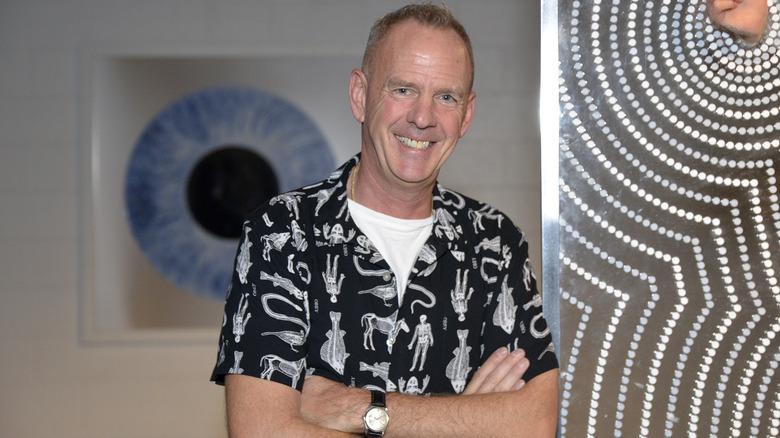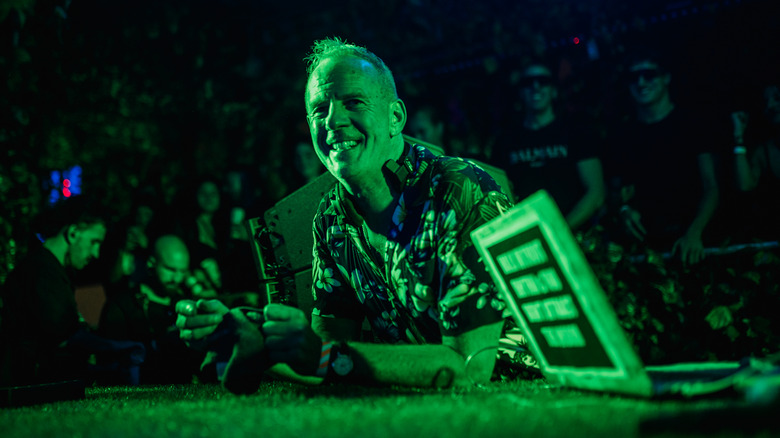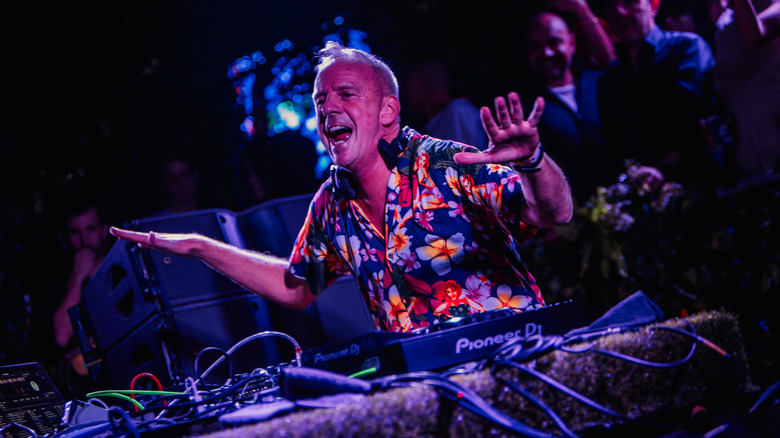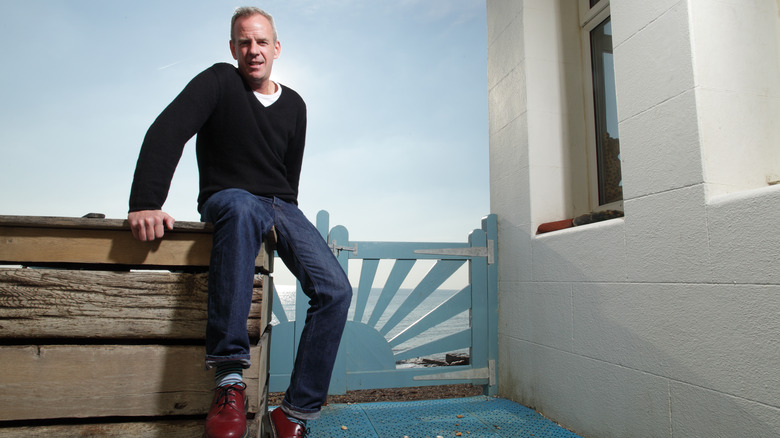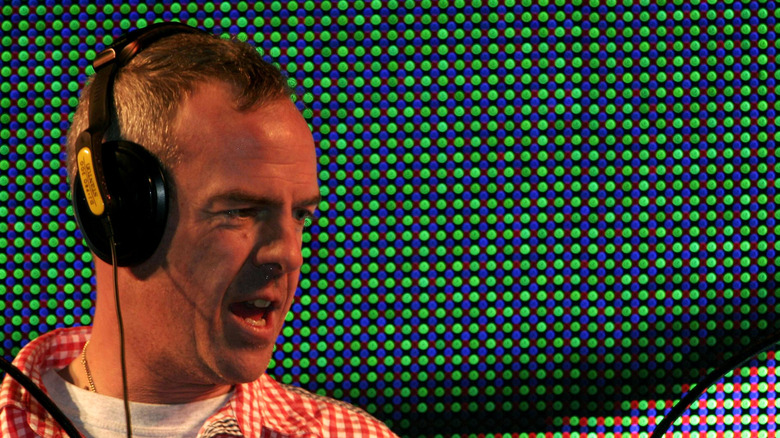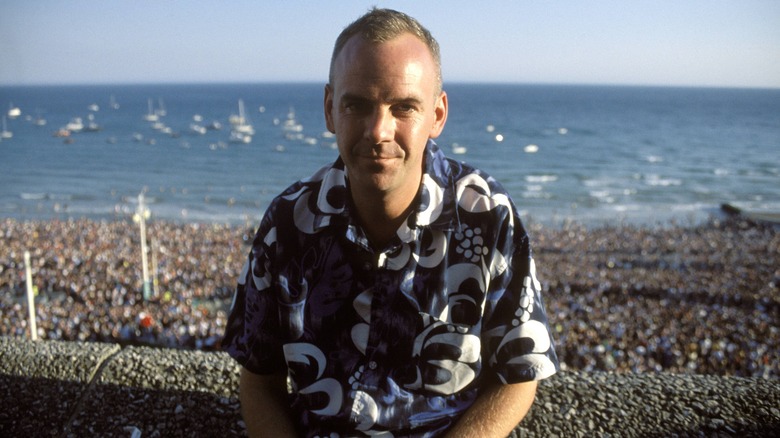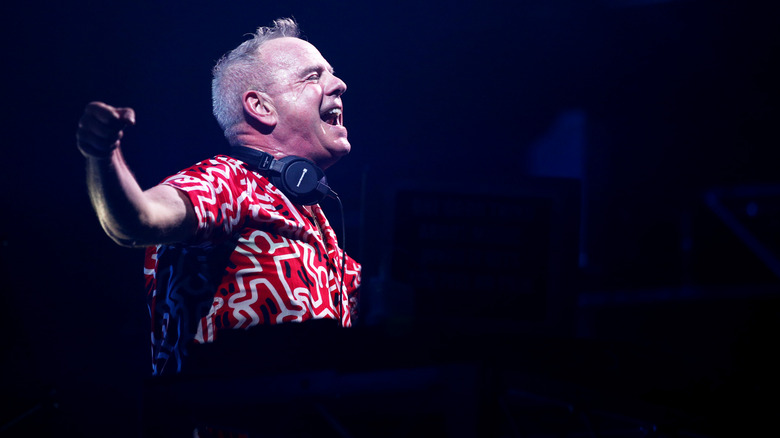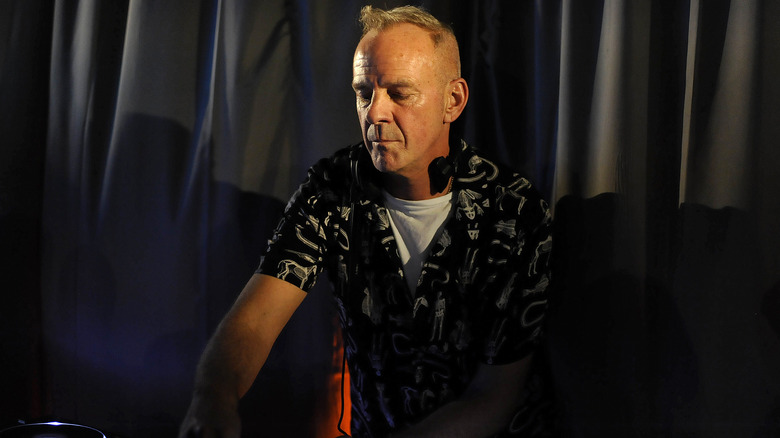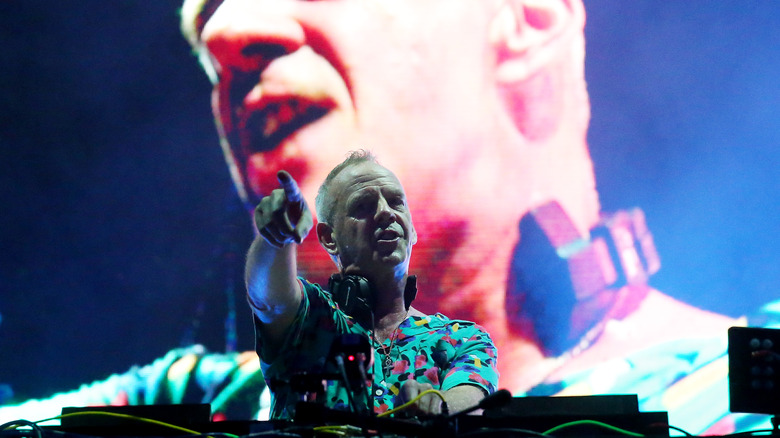The Untold Truth Of Fatboy Slim
The name Fatboy Slim brings to mind a few things. First, there's the kind of party that turns into a blur about halfway through and leaves behind shadowy memories of loud music, a light show, and probably some adults-only substances. Then, there's that Christopher Walken video, which won a Grammy and has racked up more than 69 million views on YouTube as of this writing. So, it's worth mentioning that when NME sat down to chat with Norman Cook — the man behind Fatboy Slim — they brought up the "Weapon of Choice" video, and it's a bit of a sore subject.
Cook shared the fact that the video was the brainchild of director Spike Jonze and Walken himself, and Cook was supposed to be in it. They had written him in, but when Cook's wife went into labor at the same time they were scheduled to film, he missed out on the entire thing. It's the very definition of disappointment.
If there's one thing Fatboy Slim has taught everyone about music, it's that there are no rules after all — and that's ironically by design. Cook explained to SynthHistory that he was a teenager when the punk scene exploded. "That really sort of inspired me to break rules when making music. You know, there was a kind of independent spirit, a challenging spirit, a provocative spirit that I got from punk rock," he said. How, exactly, did he get there — and how on earth does he keep going?
A suburban childhood and a forgotten religion
Childhood shapes everyone, and for the man who would become Fatboy Slim, it taught him what he didn't want to be: middle-class. Contrary to the origin stories of countless entertainers, Norman Cook (born Quentin Leo Cook) was brought up by a father who worked as an environmental consultant and went above and beyond for his convictions, receiving a British Empire award after spearheading a movement to introduce small recycling centers across the country. To Cook, it was awful. He told The Guardian, "Leaving the house to attend promo events, he'd have his face painted and be dressed as Ally Jam-Jar, a character he'd invented, which was a constant embarrassment to me."
His mother, meanwhile, was a teacher, and according to an interview he did with the Irish Independent, both of his parents were Kosmons, meaning they belonged to a religious sect so small that there's not even that much information available on it, save a 2018 report from The New York Times on a re-branded Kosmon Temple that opened in Brooklyn.
Cook told the Independent that his goals in life were to become working-class, just like his grandfather, who had washed windows. He was straightforward about his problem with the middle class, too, saying there was one particular thing that grated on him: "It's about believing you are better than other people. Or, that's what I thought when I was a kid. Now, I can see there are good things about it."
The moment he knew music was his thing
Long before Fatboy Slim was born, Norman Cook was a staple on the invite list for countless parties. According to what he told The Guardian, it was, unsurprisingly, because of his record collection. He was DJ-ing by the time he was 15, and he'd already decided that music was what his life was going to be about.
In a conversation with Stuff, he shared a story about the moment when he knew: He was 8 years old, and when he, his siblings, and his parents would all start singing together to break up the monotony of long car rides, it became one of the most brilliant memories of his childhood. It makes sense, then, that small gigs are his favorite.
"The noise and this power when all five of us [sang] in harmony together... something happened that was powerful and moving. I think that's when I fell in love with music," he said. In particular, he was talking about the Beatles. That, he told SynthHistory, was the only group that he and his parents could really enjoy together. Otherwise, he found their taste in music rather questionable, saying, "[The Beatles] were the only cool music my parents liked. They liked a lot of really, really, really bad music."
He's a massive art collector... even though he's colorblind
Fatboy Slim, aka Norman Cook, collects things. Like, a lot of things, to the point where Clash called him a hoarder when they got a look at the massive collections he had assembled. His collections are epic, meaningful, and ultra-personal, and include something — such as a wristband — from every show he's ever done. There's also, of course, Hawaiian shirts and smiley-face memorabilia, but more surprising is his relationship with his art collection.
He told WhyNow, "I used to have no real interest in art whatsoever. I'm colorblind, so I don't really appreciate color. I was never really into any form of art until I became obsessed with hip hop and started liking graffiti." Graffiti is usually pretty colorful stuff, so how did that come about?
Cook explained that he'd wandered into a U.S. gallery and discovered the pop artist who created artwork with some seriously smiley vibes: Keith Haring. "I ended up buying a suite of Haring prints — that's what got me into the idea of having art on the walls. ... To me, [buying art] felt like being part of a gang. I just wanted to be in their gang!" Since his first foray into the art world, he's gotten so serious about it, he's even collaborated with the mysterious Banksy.
Here's why he doesn't use his platform for politics
It's pretty standard for musicians, actors, and other entertainers to use their star power to promote things that are near and dear to them, from charities to politics. In the late 1980s, Norman Cook wasn't just vocal about his beliefs; as Vice found while researching his work before a 2017 interview, he had sworn to "never do anything or make music that ignored politics." That's a pretty bold statement, and it's an ideology that's noticeably missing from Fatboy Slim's playbook. What happened?
"That was a lovely, youthful idea to have," he explained. "When I started, with the Housemartins, we really thought we could change the world. We wanted to change the world. Gradually, over the years, it gets beaten out of you."
He went on to say that when he grew up, it was a time of unrest, workers' strikes, and poverty that gripped entire sections of the U.K. It spiraled out of control under the bootheel of Margaret Thatcher, and the last straw for him was a Thatcher re-election. It was the exact opposite of the outcome he'd campaigned for, and it changed his outlook on politics forever: "I thought: That's it. I'm not going to try and tell these people what's good for them if they're not going to listen to me."
He has a weird relationship with food
Fatboy Slim has "cook" right in his real name, and an extraordinary relationship with food. For starters, he's had plenty of experience owning his own restaurants. When work slowed during the COVID-19 pandemic, he got behind the counter to work at the cafe he owns in Brighton Beach, shares Great British Life. Then, there's also the fact that he had a partnership in New York City's The Spotted Pig, which just happened to have a Michelin star. That's not too shabby for someone who told The Guardian that he only learned to cook when his wife was pregnant.
He had some pretty decent help, though, admitting that he had Jamie Oliver's phone number in case he had any questions. And yes, he's used it: "I once contacted him in Australia to check exactly how much a glug of oil is."
Then, there's his confession that growing up, food was a necessity and not an indulgence. "Food in our house was never meant to be a pleasure. It was about thrift, health, and recycling," he explained. Once he started DJ-ing, he developed his own quirks: no food at all in the five hours before he goes on stage or in the time between performing and bedtime, with the single exception being a banana, or perhaps a pork pie. He has learned an important lesson, though, and after going four days without eating (at Glastonbury, in order to avoid the venue's toilets), he doesn't do that kind of extreme fasting anymore.
He's good friends with Paul McCartney
There's an old saying that one should never meet their heroes, but it turns out that's not always the case. Fatboy Slim — i.e., Norman Cook — has talked about how he didn't just meet Paul McCartney, he lived next door to him. Cook confirmed to Vice that it was just as surreal as it sounds like it would be.
"When he walks into your kitchen, you really try to just say, 'That's all right, it's just my neighbor, Paul.' Try and forget he's in the Beatles. In the summer, we'd have the doors open so you could wander in and out of each other's houses. He'd go past on the decking in a Speedo. People would say, 'Is that Paul McCartney that just walked past?!' And I'd just say, 'Yep.'"
Some of the other stories Cook has shared suggest that McCartney wasn't just a high-profile neighbor. When Cook and his wife, Zoe Ball, were going through a rough patch, he told the Irish Examiner that it was McCartney who reached out. "Paul gave me a shoulder to cry on. He told me to get out of the U.K. until the heat died down. That was a bad time, as we messed up in public." Cook told NME that McCartney gave him similar advice after that infamous show at Brighton Beach turned into a storm of media controversy, adding, "He's a lovely man, and like the dad I always wanted."
He's been candid about what rehab and sobriety meant for him
In 2009, the man behind the DJ Fatboy Slim had an epiphany. Norman Cook told The Mirror that he and then-wife Zoe Ball had decided to get sober together, but it wasn't easy: "Zo just quit drinking so easily and said she didn't want to do it anymore. I couldn't. I tried, and found out I was an addict."
He checked into rehab, where he faced the fears that went along with getting sober. Chief among them? "I was scared that DJ-ing sober would be a nightmare. I was s****ing myself that I wouldn't be able to do it or be as good." Ultimately, though, he's said that the opposite happened. In an interview with the Irish Examiner, he said that not only has he come to appreciate his work more, but he was pretty sure it's allowed him to keep doing what he's doing longer. "I don't think I could physically take the pace if I was still partying," he said.
And it was a lot. In an honest interview with the Independent, he shared the fact that for many of his old shows and the cities he visited, the memories he has are iffy at best. But still, he says that when he knew he was missing out on time and memories with his family — particularly their young son — he wanted to change.
If you or anyone you know needs help with addiction issues, help is available. Visit the Substance Abuse and Mental Health Services Administration website or contact SAMHSA's National Helpline at 1-800-662-HELP (4357).
That Brighton gig, in hindsight
Advertise something as free, and the masses will come. That's an idea that was vastly underestimated by the organizers of 2002's Big Beach Boutique II, because although they had expected 60,000 people, a whopping 250,000 people showed up. It was potentially terrifying: Despite safety concerns, Fatboy Slim was told to get out there, because the protests over a cancelled event were likely to be worse than whatever would happen during the show.
Fatboy Slim did perform, but behind the scenes, Norman Cook was terrified. He told News.com.au, "When I first arrived in this room, I was looking outside thinking this is brilliant, there is so many people. But then it turned into, 'There are SO many people.'"
It was so tense — from his point of view, at least — that he doesn't remember much about the actual gig itself, aside from the sheer energy and force of nature that the crowd became. And, of course, the death of Karen Manders, an Australian nurse who died after falling more than 30 feet at a post-gig party. Cook reached out to her family afterward, and her mother assured him it wasn't his fault: "She told me that her daughter phoned her earlier in the night, and said she was having the best night of her life. And she said, 'Thanks for making the last of her life, the best night of her life.' That really kind of got me. ... [Her death] will always haunt me."
Living life according to the five Fs
When the Independent spoke with Norman Cook — the everyday guy behind Fatboy Slim — in 2015, he was 51 years old and still going. How? For starters, he cut back his workload to include only about 70 shows a year. Those shows were carefully selected in accordance with his principles of the five Fs, and it's pretty brilliant.
Opportunities only became shows if they fulfilled three of the five Fs, a set of criteria that put some strict guidelines on what Cook was willing to do. In order to get him on stage, the gig has to be a First, a Favor, or something he'd be doing just for the sheer Fun of it. Another potential box to check is Finance, which basically means he'd be paid really well for what he would be asked to do, and that's something we can all relate to. And finally, there's Food. It turns out that sometimes, Cook opts to perform a gig in a city or location if he has a favorite restaurant there, or if the local cuisine is something that he always wanted to try. Now that's living the life.
Here's his weird, pre-gig ritual
Most people have to give themselves a pep talk before they go to work, or at least have some tried-and-true rituals for getting in the right mindset. It turns out that it takes something a little stronger than a cup of coffee to turn Norman Cook into Fatboy Slim, and he talked about his pre-gig ritual on a podcast called The Life of the Party (via the Huffington Post). He said that although his ways have changed a bit with sobriety, he's still pretty particular about what happens before he takes the stage.
"My rider is six Red Bulls, two airhorns, two towels, and some upmarket nuts. My ritual before I go on ... is I take off my shoes, I put on a Hawaiian shirt, my tour manager slaps me really hard across my cheeks... and then I'm on." Extreme? Maybe. He continued, explaining: "Three Red Bulls and a slap across the face is pretty much like doing a line just before you go on to DJ." That's certainly one way to do things, although it's unclear as to whether or not Red Bull has ever approached him with some advertising work.
What does he consider his favorite track, worst DJ-ing choice, and missed opportunity?
Just like everyone's curious about what a chef eats on her day off, we might wonder what songs stand out for a DJ. Fortunately for the curious, Fatboy Slim, aka Norman Cook, answered that for a piece in The Guardian.
First, the good, and starting with what he sees as the ideal festival track. Perhaps surprisingly, that's John Paul Young's "Love Is in the Air," which brought back memories of Glastonbury. Also good is the song he said he would be most likely to play if he wanted to show off some serious range, and that's the Incredible Bongo Band's "Apache."
Now, the regret. Cook said that if there was one album he wished he'd discovered and signed, it's Kideko & George Kwali's "Crank It." Why? The music itself is just one part — albeit, a large part — but he added that he learned after he'd heard it that George's father was an old friend of his. (Yes, Fatboy Slim has been around for that long.) Another sort of deep-seated sigh is the track that reminded him that not every song is a winner for every audience, and even the most experienced DJs can have an off day. The one he wishes he'd never played? "Gin and Juice," by The Gourds. "I was doing really well at a festival in Sweden, I think, and wanted to finish with a flourish. Sadly... I backed off stage with my tail between my legs."
Drugs and the next generation
Norman Cook and his alter ego, Fatboy Slim, famously dealt with the end of his first marriage by looking for a little help from ecstasy — much to the chagrin of anti-drug campaigners — but rather than a "good or bad" sort of conversation, Cook has actually moved on to have one that's much more interesting: How had the landscape changed?
When he talked to Vice about precisely that, chief among his observations was that the popularity of ecstasy when he was first starting out as a DJ meant that crowds on the dance floor were much more interactive than he saw them as being in 2017. "With the current generation, it's definitely less cuddly on the dance floor. Different drugs. The whole minimal K crowd are a strange bunch. They're interacting in their own heads, not really doing much."
He had something to say about young DJs, too, and he was well aware of the irony. Older generations are likely to have a reputation of telling the young and inevitably foolish to go and get off their lawn, it's after 9 p.m., don't you all have school tomorrow? But Cook took a swing at up-and-coming DJs in quite the opposite way: "The new school are young, good-looking, but not hugely interesting. A lot of them are interchangeable." Are things getting more boring out at the clubs? Fatboy Slim seems to think so.
